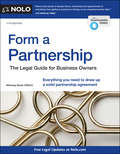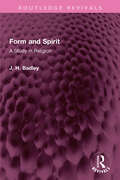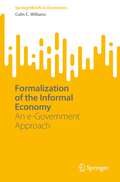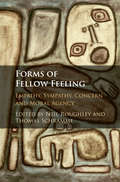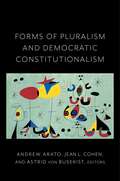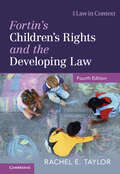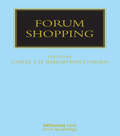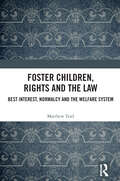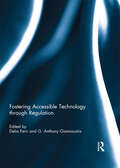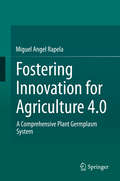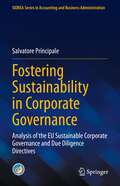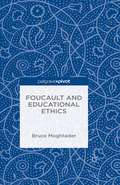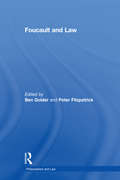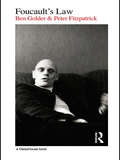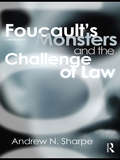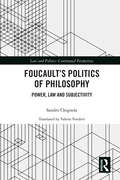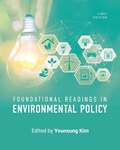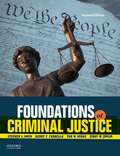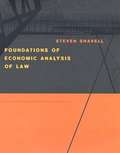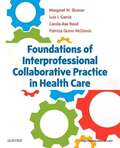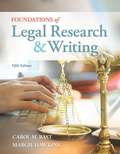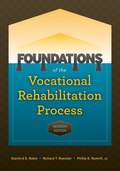- Table View
- List View
Form a Partnership: The Legal Guide for Business Owners
by Ralph Warner Denis CliffordThe nuts-and-bolts guide to forming a partnership A solid partnership agreement is the foundation for a lasting and successful business partnership. Don’t skip this essential step, or you might run into major problems later. Form a Partnership helps you create the agreement you need for your shared business venture. It takes you through the important issues, then helps you write your own partnership agreement tailored to your needs, clause-by-clause. The book covers: cash, property, and service contributions financial and tax liabilities how partners will make decisions allocating profits and losses admitting new partners what happens if a partner wants out buying out a partner’s interest the death of a partner and much more. The 11th edition—completely updated to reflect current law and business issues—provides the forms, worksheets, and legal information you need to create a partnership agreement. With Downloadable Forms: download and customize partnership agreements (details inside).
Form and Spirit: A Study in Religion (Routledge Revivals)
by J.H. BadleyFirst published in 1951, Form and Spirit deals with two primary questions regarding religion- a) the nature of religion as a permanent need in human life, and its relation to the cults and creeds in which it has been embodied, and b) whether what is admittedly a crying need of our time can be met by the revival of religious forms which have lost their hold. An attempt is made to trace the evolution of religion, and a brief survey is given of the development of the chief world religions. The object is not to show that any of these can be accounted ‘truer’ than the rest but rather to see what were the reasons for the forms that they have taken, and what elements and tendencies are common to them, as throwing light both on the meaning of religion and on the needs of man's spiritual nature. This is an essential read for general readers interested in religion.
Formalization of the Informal Economy: An e-Government Approach (SpringerBriefs in Economics)
by Colin C. WilliamsThis Brief provides a cutting-edge evaluation of the application of digital technologies to tackle the informal economy. Employing institutional theory to explain the informal economy, this book reveals that the informal economy arises when formal institutional failings trigger a gap between the formal rules of the game and social norms. Chapters outline how use of digital technologies by public authorities, such as tax, social security and labor authorities, can alter social norms so that they accord with the formal rules of the game and generate a formalization of the informal economy. Setting out the e-government tools that can improve the relationship between businesses, employers, workers and citizens, and government, this book will be essential reading for academics and advanced students studying development economics, labor economics, public economics, behavioral economics, economic sociology and institutional economics as well as for government policymakers working in related fields.
Forming a Culture of Peace
by Karina V. KorostelinaThis book challenges the discourses, narrative frames, and systems of beliefs that support and promote violence and conflict, it defines new comprehensive approaches to human security as preventative and empowering to individuals, and it provides conceptual frameworks and methodological tools for enhancing the processes of communicating peace.
Forms of Fellow Feeling
by Neil Roughley Thomas SchrammeWhat is the basis of our capacity to act morally? This is a question that has been discussed for millennia, with philosophical debate typically distinguishing two sources of morality: reason and sentiment. This collection aims to shed light on whether the human capacity to feel for others really is central for morality and, if so, in what way. To tackle these questions, the authors discuss how fellow feeling is to be understood: its structure, content and empirical conditions. Also discussed are the exact roles that relevant psychological features - specifically: empathy, sympathy and concern - may play within morality. The collection is unique in bringing together the key participants in the various discussions of the relation of fellow feeling to moral norms, moral concepts and moral agency. By integrating conceptually sophisticated and empirically informed perspectives, Forms of Fellow Feeling will appeal to readers from philosophy, psychology, sociology and cultural studies.
Forms of Pluralism and Democratic Constitutionalism (Religion, Culture And Public Life Ser. #3)
by Christophe Jaffrelot Nadia Urbinati Alfred Stepan Yüksel Sezgin Frederick Cooper Patrick Macklem Courtney Jung Emmanuelle Saada Katharina Pistor Gary Wilder Joshua Simon Tsilly Dagan Rob Howse Michael Karayanni Jeff MileyThe achievements of the democratic constitutional order have long been associated with the sovereign nation-state. Civic nationalist assumptions hold that social solidarity and social plurality are compatible, offering a path to guarantees of individual rights, social justice, and tolerance for minority voices. Yet today, challenges to the liberal-democratic sovereign nation-state are proliferating on all levels, from multinational corporations and international institutions to populist nationalisms and revanchist ethnic and religious movements. Many critics see the nation-state itself as a tool of racial and economic exclusion and repression. What other options are available for managing pluralism, fostering self-government, furthering social justice, and defending equality?In this interdisciplinary volume, a group of prominent international scholars considers alternative political formations to the nation-state and their ability to preserve and expand the achievements of democratic constitutionalism in the twenty-first century. The book considers four different principles of organization—federation, subsidiarity, status group legal pluralism, and transnational corporate autonomy—contrasts them with the unitary and centralized nation-state, and inquires into their capacity to deal with deep societal differences. In essays that examine empire, indigenous struggles, corporate institutions, forms of federalism, and the complexities of political secularism, anthropologists, historians, legal scholars, political scientists, and sociologists remind us that the sovereign nation-state is not inevitable and that multinational and federal states need not privilege a particular group. Forms of Pluralism and Democratic Constitutionalism helps us answer the crucial question of whether any of the alternatives might be better suited to core democratic principles.
Fortin's Children's Rights and the Developing Law (Law in Context)
by Rachel E. TaylorThe notion that children constitute an important group of rights holders has gained increasing acceptance both domestically and internationally. Nevertheless, this rhetorical commitment to children's rights is not necessarily realised in practice. Now in its fourth edition, Fortin's Children's Rights and the Developing Law explores the extent to which law and policy in England promotes or undermines the rights of children. Fully revised and updated, this textbook uses current research on child development and welfare to reflect on the extent to which the law fulfils children's rights in a wide range of areas, including medical law, education and child poverty. These developments are measured again the domestic law and the UK's international obligations under, for example, the United Nations Convention on the Rights of the Child.
Forum Shopping
by Carel Baron van LyndenThis reference book, arranged alphabetically by country, describes how to found jurisdiction in over 20 jurisdictions. A questionnaire-based analysis ensures consistent headings are used throughout to allow cross-referencing and points of comparison between the various jurisdictions covered. Despite the existence of various international conventions designed to ensure uniformity of approach, significant differences in the laws of various countries exist which make it possible to create jurisdiction in one country which is not possible elsewhere. This reference book, arranged alphabetically by country, describes in a clear but concise manner how to found jurisdiction in over 20 jurisdictions. A questionnaire-based analysis ensures consistent headings are used throughout to allow easy cross-referencing and points of comparison between the various jurisdictions covered.
Forum Shopping in International Adjudication
by Luiz Eduardo SallesForum shopping, which consists of strategic forum selection, parallel litigation and serial litigation, is a phenomenon of growing importance in international adjudication. Preliminary objections (or a party's placement of conditions on the existence and development of the adjudicatory process) have been traditionally conceived as barriers to adjudication before single forums. This book discusses how adjudicators and parties may refer to questions of jurisdiction and admissibility in order to avoid conflicting decisions on overlapping cases, excessive exercises of jurisdiction and the proliferation of litigation. It highlights an emerging, overlooked function of preliminary objections: transmission belts of procedure-regulating rules across the 'international judiciary'. Activating this often dormant, managerial function of preliminary objections would nurture coordination of otherwise independent and autonomous tribunals.
Foster Children, Rights and the Law: Best Interest, Normalcy and the Welfare System
by Matthew TrailThis book discusses child wishes, rights and participation in the foster care system. Making decisions in a foster child’s best interest is a widely used, but also widely criticized international legal doctrine. This work discusses the two major legal frameworks, best interest and normalcy, for which foster care decisions are made and how those frameworks might shape how child welfare professionals view and interpret children’s rights and participation. Normalcy, the idea that decisions should promote a “normal” life, is a separate legal doctrine which can be in conflict with best interest determinations. However, the concept of normalcy is also theoretically built into best interest decisions and therefore also plays a role in most child welfare systems. Mixing both empirical legal and child welfare research, the book demonstrates the ways in which risk aversion and fear drive best interest decision-making to the detriment of both practitioners and the children they aim to serve. It argues that a children’s rights framework starting with normalcy is a better tool for promoting child participation and centering the child within the dependency process. The book will be of interest to academics, researchers and policymakers working in the areas of children’s rights law, child welfare and international human rights law.
Fostering Accessible Technology through Regulation
by Delia Ferri and G. Anthony GiannoumisTechnology has attracted an increasing level of attention within studies of disability and disability rights. Many researchers and advocates have maintained skepticism towards technology out of the fear that technology becomes another way to ‘fix’ impairments. These skeptical views, however, contrast with a more positive approach towards the role that technology can play in eliminating barriers to social participation. Legal scholarship has started to focus on accessibility and accessible technology and in conjunction with the recently adopted United Nations Convention on the Rights of Persons with Disabilities has put a great emphasis on accessibility, highlighting the role that accessible technology plays in the promotion and protection of the rights of people with disabilities. Against this background, this book gathers together different contributions that focus on enhancing the production, marketing and use of accessible technology. Building upon previous academic studies and in light of the UNCRPD, accessible technology is considered a tool to increase autonomy and participation. Overall, this book attempts to show, through a multifaceted and inter-disciplinary analysis, that different regulatory approaches might enhance accessible technology and its availability. This title was previously published as a special issue of the International Review of Law, Computers & Technology.
Fostering Innovation for Agriculture 4.0: A Comprehensive Plant Germplasm System
by Miguel Angel RapelaThe scientific and technical development of any kind of germplasm is regulated by a vast network of treaties, conventions, international agreements, and national and regional legislation. These regulations govern biotechnological innovations in plants and microorganisms, access to and use of plant genetic resources, and biosafety. This complex mix has made it difficult to arrive at global interpretations, due to overlaps, gaps, ambiguities, contradictions, and lack of consistency. The big picture is even more complex, as a series of scientific developments – gene editing in particular – have in some cases rendered these international regulatory frameworks obsolete.This book puts forward an innovative approach: a “Comprehensive Plant Germplasm System”. The System is a cooperative game theory-based proposal for a binding international convention which would supersede all other conventions, treaties, national and regional legislation covering native varieties and traditional developments, heterogeneous plant varieties, microorganisms, biotechnological inventions, plant genetic resources, and biosafety regulation. In short, it offers a comprehensive framework regarding intellectual property, biosafety, and business regulation and covers all types of germplasm.If applied, the system is expected to yield higher productivity rates in crops and improved food biodiversity, as well as a new paradigm based on the promotion of innovation for “Agriculture 4.0.”
Fostering Sustainability in Corporate Governance: Analysis of the EU Sustainable Corporate Governance and Due Diligence Directives (SIDREA Series in Accounting and Business Administration)
by Salvatore PrincipaleThe effects of climate change on the one hand, and government promises to achieve sustainable development on the other, are only two examples of the factors driving businesses to incorporate sustainability into their business strategies. International organizations and researchers alike contend that incorporating sustainability into business is only feasible when governance also considers environmental, social and governance (ESG) issues. Therefore, corporate governance is attracting more and more attention from investors and various stakeholders. On 23 February 2022, the European Commission adopted a proposal for a Directive on corporate sustainability due diligence. The aim of this Directive is to foster sustainable and responsible corporate behaviour and to anchor human rights and environmental considerations in companies’ operations and corporate governance. Drawing on the theoretical framework of corporate governance and an analysis of the latest and most important literature on corporate governance and sustainability, this book offers essential insights, particularly in light of the Sustainable Corporate Governance Directive and Due Diligence Directive.
Foucault and Educational Ethics
by Bruce MoghtaderIn his works on ethics, Foucault turned towards an examination of one's relationship with oneself and others. This differs from the modern approaches that explore the relationship between and the responsibilities of actors to each other by adopting criteria. Ethical criteria engender assumptions about the actors by focusing on their responsibilities. Instead of relying on criteria, Foucault's writing and lectures contributed to an awareness of the activities we take upon ourselves as ethical subjects. His reconstruction of the Greco-Roman ethics seeks to examine the possibilities of the reconstitution and transformation of subjectivity. Through this, he offers an avenue of understanding the formation of ethical subjects in their educational interrelationships.
Foucault and Law: On Law, Power And Rights (Philosophers And Law Ser.)
by Ben Golder Peter FitzpatrickFew thinkers can have had a more diverse or a more contested impact on theorizing law than Michel Foucault. This diversity is reflected in the wide range of Foucault's work and of the intellectual fields it has so conspicuously influenced. Such diversity informs the present collection and is signalled in the headings of its four sections: � Epistemologies: archaeology, discourse, Orientalism � Political philosophy: discipline, governmentality and the genealogy of law � Embodiment, difference, sexuality and the law � The subject of rights and ethics. Whilst the published work selected for this collection amply accommodates this diversity, it also draws together strands in Foucault's work that coalesce in seemingly conflicting theories of law. Yet the editors are also committed to showing how that very conflict goes to constitute for Foucault an integral and radical theory of law. This theory ranges not just beyond the restrained and diminished conceptions of law usually derived from Foucault, but also beyond the characteristic concern in Jurisprudence and Legal Philosophy to constitute law in its difference and separation from other socio-political forms.
Foucault's Law
by Ben Golder Peter FitzpatrickFoucault’s Law is the first book in almost fifteen years to address the question of Foucault’s position on law. Many readings of Foucault’s conception of law start from the proposition that he failed to consider the role of law in modernity, or indeed that he deliberately marginalized it. In canvassing a wealth of primary and secondary sources, Ben Golder and Peter Fitzpatrick rebut this argument. They argue that rather than marginalize law, Foucault develops a much more radical, nuanced and coherent theory of law than his critics have acknowledged. For Golder and Fitzpatrick, Foucault’s law is not the contained creature of conventional accounts, but is uncontainable and illimitable. In their radical re-reading of Foucault, they show how Foucault outlines a concept of law which is not tied to any given form or subordinated to a particular source of power, but is critically oriented towards alterity, new possibilities and different ways of being. Foucault’s Law is an important and original contribution to the ongoing debate on Foucault and law, engaging not only with Foucault’s diverse writings on law and legal theory, but also with the extensive interpretive literature on the topic. It will thus be of interest to students and scholars working in the fields of law and social theory, legal theory and law and philosophy, as well as to students of Foucault’s work generally.
Foucault's Monsters and the Challenge of Law
by Alex SharpeIn contrast to other figures generated within social theory for thinking about outsiders, such as Rene Girard’s ‘scapegoat’ and Zygmunt Bauman’s ‘stranger’, Foucault’s Monsters and the Challenge of Law suggests that the figure of ‘the monster’ offers greater analytical precision and explanatory power in relation to understanding the processes whereby outsiders are constituted. The book draws on Michel Foucault’s theoretical and historical treatment of the category of the monster, in which the monster is regarded as the effect of a double breach: of law and nature. For Foucault, the monster does not simply refer to a particular kind of morphological or psychological irregularity; for the body or psyche in question must also pose a threat to the categorical structure of law. In chronological terms, Foucault moves from a preoccupation with the bestial human in the Middle Ages to a concern over Siamese or conjoined twins in the Renaissance period, and ultimately to a focus on the hermaphrodite in the Classical Age. But, although Foucault’s theoretical framework for understanding the monster is affirmed here, this book's study of an English legal history of the category ‘monster’ challenges some of Foucault’s historical claims. In addition to considering this legal history, the book also addresses the contemporary relevance of Foucault’s theoretical framework. Structured around Foucault’s archetypes and the category crises they represent – admixed embryos, conjoined twins and transsexuals – the book analyses their challenge to current distinctions between human and animal, male and female, and the idea of the ‘proper’ legal subject as a single embodied mind. These contemporary figures, like the monsters of old, are shown to threaten the rigidity and binary structure of a law that still struggles to accommodate them.
Foucault's Politics of Philosophy: Power, Law, and Subjectivity (Law and Politics)
by Sandro ChignolaOriented around the theme of a ‘politics of philosophy’, this book tracks the phases in which Foucault’s genealogy of power, law, and subjectivity was reorganized during the 14 years of his teaching at the College de France, as his focus shifted from sovereignty to governance. This theme, Sandro Chignola argues here, is the key to understanding four features of Foucault’s work over this period. First, it foregrounds its immediate political character. Second, it demonstrates that Foucault’s "Greek trip" also aims at a politics of the subject that is able to face the processes of the governmentalization of power. Third, it makes clear that the idea of the "government of the self" is – drawing on an ethics of intellectual responsibility that is Weberian in origin – an answer to the processes that, within neoliberal governance, produce the subject as an individual (as a consumer, a market agent, an entrepreneur, and so on). Fourth, the theme of a ‘politics of philosophy’ implies that Foucault’s research was never simply scholarly or neutral; but rather was characterized by a specific political position. Against recent interpretations that risk turning Foucault into a scholar, here then Foucault is re-presented as a key figure for jurisprudential and political-philosophical research.
Foucault, Crime and Power: Problematisations of Crime in the Twentieth Century
by Christian BorchThis book presents a Foucauldian problematisation analysis of crime, with a particular focus on the twentieth century. It considers how crime has been conceived as problem and, by scrutinising the responses that have been adapted to deal with crime, demonstrates how a range of power modalities have evolved throughout the twentieth century. Christian Borch shows how the tendency of criminologists to focus on either disciplinary power or governmentality has neglected the broader complex of Foucault’s concerns: ignoring its historical underpinnings, whilst for the most part limiting studies to only very recent developments, without giving sufficient attention to their historical backdrop. The book uses developments in Denmark – developments that can be readily identified in most other western countries – as a paradigmatic case for understanding how crime has been problematised in the West. Thus, Foucault, Crime and Power: Problematisations of Crime in the Twentieth Century demonstrates that a Foucauldian approach to crime holds greater analytical potentials for criminological research than have so far been recognized.
Foundational Readings in Environmental Policy
by Younsung KimThrough an enlightening collection of academic articles, Foundational Readings in Environmental Policy deepens and broadens students' knowledge of the root cause of environmental policy and also provides suggested solutions to mitigate environmental impacts. Students are encouraged to better understand the complex nature of environmental issues, today's environmental policy approaches, and technologies and approaches that can create a more sustainable future. The anthology is organized into the units. Unit I covers the fundamental principles of environmental policy and politics. The readings explore the main features of environmental policy, how it differs from public policy, how policy is formed, the key actors involved in implementing policies, and more. Unit II outlines environmental issues beyond geographic boundaries and which are not limited to the natural/ecological realm. The readings focus on climate change, energy, and biodiversity loss. The final unit discusses emerging environmental issues and policy approaches, including environmental inequality, waste management, sustainable businesses, issues related to energy access in developing countries, and strategies for the future. Filling a gap in the current literature, Foundational Readings in Environmental Policy is an ideal resource for courses and programs in environmental policy.
Foundations Of Criminal Justice (Second Edition)
by Henry F. Fradella Stephen S. Owen Tod W. Burke Jerry W. JoplinWhat is law? What is deviance? What is justice? How is justice achieved through law, punishment, and criminal justice agencies? Foundations of Criminal Justice, Second Edition, uses a unique approach that provides students with the framework and the intellectual tools that they will need in order to critically analyze and evaluate the nature, sources, scope, purposes, and practical limitations of the criminal justice system. This is the only introductory survey text that moves beyond a description of the criminal justice system, helping students understand the role of criminal justice in their lives as criminal justice practitioners and as active citizens.
Foundations Of Economic Analysis Of Law
by Steven ShavellIn this book Steven Shavell provides an in-depth analysis and synthesis of the economic approach to the building blocks of our legal system, namely, property law, tort law, contract law, and criminal law. He also examines the litigation process as well as welfare economics and morality. Aimed at a broad audience, this book requires neither a legal background nor technical economics or mathematics to understand it. Because of its breadth, analytical clarity, and general accessibility, it is likely to serve as a definitive work in the economic analysis of law.
Foundations Of Interprofessional Collaborative Practice In Health Care
by Margaret Slusser Luis I. Garcia Carole-Rae Reed Patricia Quinn McGinnisHealth care is a team effort, so why keep training for solo sprints?Introducing Foundations of Interprofessional Collaborative Practice in Health Care - a unique new textbook that will equip you to become an effective member of interprofessional healthcare teams. This completely new textbook is the first on the market to introduce the Interprofessional Education Collaborative (IPEC, 2011, 2016) Core Competencies for Interprofessional Collaborative Practice and to provide practice in applying these competencies to everyday practice. Expertly written by an interprofessional team for a wide variety of health professions students, this textbook provides a solid foundation in the four Core Competencies: Values and Ethics for Interprofessional Practice, Roles and Responsibilities, Interprofessional Communication, and Teams and Teamwork. It then elaborates each Core Competency by defining and describing each Sub-Competency. With a variety of interactive Case Studies, Caselets, and Exemplar Case Studies, it then illustrates the contributions and interconnectedness of each provider’s role to demonstrate how Core Competencies would be applied and put into action for improved patient outcomes. UNIQUE! Three-part units each addressing one of the four IPEC Core Competencies to help you to understand the core competencies and learn how to apply them in your own profession. UNIQUE! Detailed explorations of each Sub-Competency for all four IPEC Core Competencies thoroughlypresent the essential elements of each Core Competency for deep understanding of how to collaborate with other professions. UNIQUE! Case Studies, "Caselets," and Exemplar Case Studiesillustrate each competency and provide opportunities for you to apply your understanding of the material. A variety of Active Learning activities driven by core content are integrated into each chapter. UNIQUE! Global Perspectives boxes and additional international resources highlight the important work being done internationally in interprofessional education and interprofessional collaborative practice. Research Highlights help you to understand the reasoning and knowledge behind the Core Competencies. Learning Outcomes and Key Pointsoutline and review the main takeaways from each chapter.
Foundations Of Legal Research And Writing
by Carol M. Bast Margie HawkinsFOUNDATIONS OF LEGAL RESEARCH AND WRITING, Fifth Edition is the ideal resource for paralegals. The book's up-to-the-minute coverage tackles the ever-evolving areas of computer-assisted research and Cyber law, in addition to traditional legal research, analysis, and writing. Extensive research chapters address primary and secondary sources, citating, Lexis/Nexis, the Internet, and more, while writing sections center on drafting client opinion letters, pleadings, contracts, office memos, memoranda of law, and appellate briefs. Every chapter gives you practice writing opportunities, as well as traditional and computer-assisted research assignments to help develop your skills. Detailed case excerpts, samples, tips, and discussions further support the assignments, and illustrate the many perils of inadequate research and poor legal writing. Readers everywhere agree that FOUNDATIONS OF LEGAL RESEARCH AND WRITING, Fifth Edition delivers the concepts you need for success in the most demanding law firms and legal departments today.
Foundations Of The Vocational Rehabilitation Process
by Richard Roessler Stanford E. Rubin Phillip D. RumrillThe seventh edition of Foundations of the Vocational Rehabilitation Process provides historical, philosophical, legislative, and sociological foundations for the habilitation/rehabilitation of persons with disabilities. A thorough and current introduction to the American vocational rehabilitation process, this edition addresses mandates presented in the current major pieces of disability legislation influencing the practice of rehabilitation.This book presents theoretical and practical assistance in translating those mandates into positive action. It is this dual process of individual and environmental proactivity that can maximize the rehabilitation of disabled individuals. Not just for the dedicated rehabilitation counselor, this book is also for students attending an introductory course at the master's- or senior-level and in-service directors who design informative training programs. New in the seventh edition:Updated chapter on how "The Americans with Disabilities Act" (ADA), as amended in 2008, prohibits discrimination on the basis of disability in employment, public services, accommodations, and telecommunications. Updated section on the right to medical treatment in light of the 2012 "Affordable Care Act" (ACA). New information and updated references were added on the five disability types--physical disabilities, emotional disorders, intellectual disabilities, learning disabilities, and visual impairments and blindness. Now includes more than 1300 references, 300 of which are new.
